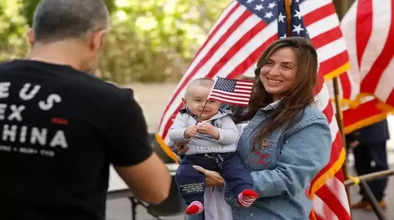US Citizenship: Newborns May Lose Automatic Citizenship, Including Children of Indians; Legal Battle Begins

In a significant policy shift, former President Donald Trump has issued an executive order ending the practice of granting automatic citizenship to individuals born on US soil. This decision has sparked widespread concern, especially among immigrant communities, including Indians residing in the United States.
Key Highlights of the New Order
-
Automatic Citizenship Policy Ends:
The executive order states that children born in the US will no longer automatically receive citizenship if neither parent is an American citizen or a green card holder. -
Impact on Immigrant Families:
- The policy directly affects thousands of Indians on temporary work visas (H-1B and L1), dependent visas (H4), study visas (F1), academic visitor visas (J1), or short-term business/tourist visas (B1 or B2).
- Children born to these visa holders from February 20, 2025, onwards will not be considered US citizens.
-
Legal and Constitutional Debate:
- Critics argue that this policy contradicts the 14th Amendment, which guarantees citizenship to anyone born on US soil and living under its jurisdiction.
- New Jersey's Democratic Attorney General Matt Platkin, alongside 17 other states, the District of Columbia, and San Francisco, has filed a lawsuit challenging the order.
- Platkin stated, "The president has vast power, but he is not a monarch," underscoring the constitutional implications of the order.
Why This Matters to Indians
Indians form a significant portion of the immigrant population in the US, and this policy could:
- Disrupt Families: Parents on temporary visas may face challenges in securing citizenship rights for their US-born children.
- Affect Immigration Plans: Families may reconsider moving to the US for work, study, or other opportunities due to uncertainties surrounding citizenship for their children.
Legal Developments
The policy is set to take effect from February 20, 2025. However:
- Court Challenges: The decision is being challenged in federal court. If a stay is granted within a month, the policy will not be implemented.
- Immigration Advocates’ Position: Legal experts and immigrant rights groups are rallying to protect the constitutional rights guaranteed under the 14th Amendment.
What’s Next?
The legal battle over this controversial order will likely set a precedent for immigration policies in the United States. For now, families affected by this policy await clarity as the court proceedings unfold.
Stay tuned for updates on how this policy may impact immigrants and their children.

